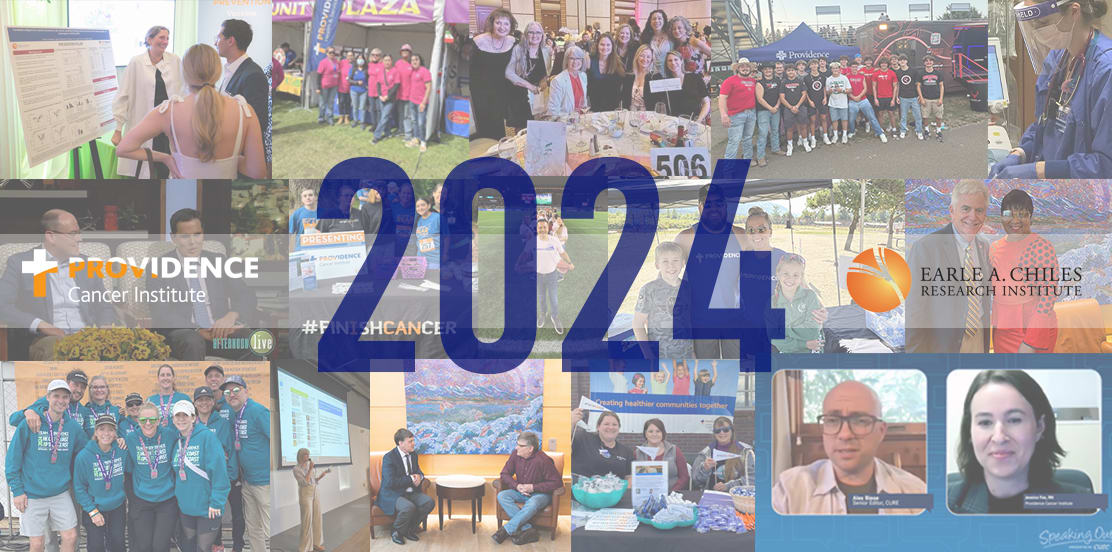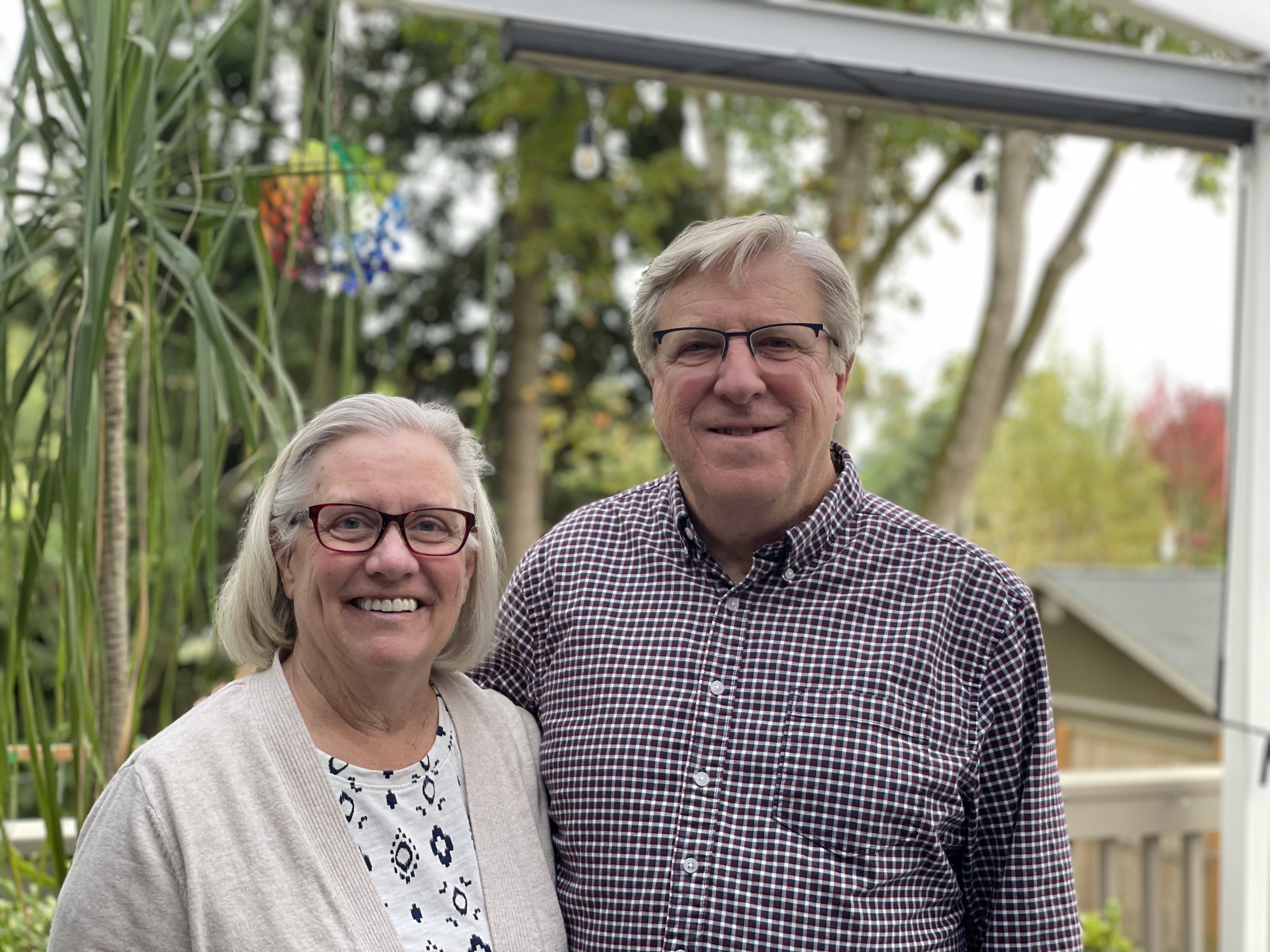Studies address need for more treatment options in endometrial cancer and AML
January 2024
Although many women with endometrial cancer are diagnosed at an early stage when it can be treated with surgery and with or without adjuvant radiation therapy, some women will experience recurrence of the disease. Unfortunately, women who experience persistent or reoccurring endometrial cancer have a poor prognosis – the average survival for this group is 12 months and treatment options are limited.
A clinical trial enrolling patients at Earle A. Chiles Research Institute, a division of Providence Cancer Institute of Oregon, aims to address the need for more therapies. The phase IB-II multi-cohort study, known as AFT-50 EndoMAP, will evaluate the efficacy and safety of targeted agents paired with the immunotherapy atezolizumab in patients with recurrent or persistent endometrial cancer who have been pre-screened using next generation (gene) sequencing.
Precision medicine determines study cohort
In the past decade, endometrial cancer has increased in both incidence and death rates in the United States, according to the National Cancer Institute, even though there has been progress in treating this patient population. For example, studies have shown encouraging response rates in patients whose tumors have microsatellite instability (MSI-hi) who are treated with anti-PD-1/PD-L1 agents. However, MSI-hi tumors make up only about 30% of endometrial cancers.
This biomarker-driven study combines anti-PD-L1 targeting (atezolizumab) and molecularly targeted agents against known biological processes in endometrial tumors. The hypothesis is that the combination of therapies will improve the response in more patients with other tumor mutations.
The targeted agents are selected based on next-generation sequencing of patients’ tumors. Depending on the sequencing results, patients will be assigned to:
- AFT-50A Protocol
- Atezolizumab + bevacizumab
- Atezolizumab + ipatasertib
- Atezolizumab + talazoparib
- Atezolizumab + trastuzumab emtansine (TDM-1)
- Atezolizumab + tiragolumab
- AFT-50B Protocol
- Inavolisib + letrozole
- Giredestrant + abemaciclib
Approximately 20 participants will be enrolled in each study cohort in AFT-50A and 24 participants in each study cohort in AFT-50B. Each study cohort will open/close independently of other study cohorts.
Providence Cancer Institute is the only site in the Pacific Northwest enrolling patients in this trial. Christopher Darus, M.D., MS, medical director, Providence Gynecologic Oncology Program, is the principal investigator.
Learn more about the trial:
The study was presented in a poster session at the 2023 ASCO Annual Meeting. Read the abstract.
Phase I study addresses need for more treatment options in patients with AML
Acute myeloid leukemia (AML) is a type of cancer frequently seen in older adults. Treating AML is difficult as it is a biologically complex tumor with a high rate of drug resistance. Although some progress has been made in recent studies, there remains an unmet medical need to expand therapeutic options given the poor prognosis in patients with relapsed/refractory (R/R) AML.
A new clinical trial currently enrolling patients aims to address this need by investigating an immunological approach to treating R/R AML.
Natural killer cell therapy product has promise
Natural killer (NK) cells are a type of immune cell that can recognize and attack tumor cells, as well as cells infected by viruses. When activated, NK cells multiply, producing cytokines that boost the immune system. NK cells are attractive as an adoptive cellular therapy because of their ability to multiply in high volume. Additionally, they are well tolerated and produce minimal toxicity.
WU-NK-101 is a non-engineered natural killer cell therapy product comprised of cells that possess cytokine-induced memory-like phenotype to support immune response and treatment resilience.
In this new phase I study, up to 18 patients with R/R AML who have exhausted other treatment options will be treated with WU-NK-101. Patients will receive up to three dose levels until maximum tolerated dose or maximum dose is determined.
The dose levels of WU-NK-101 for this trial are based on data from several clinical stage allogeneic, non-engineered NK cell programs targeting blood cancers, as well as previous clinical data from a study at Washington University School of Medicine at St. Louis that tested cytokine-induced memory-like NK cells in R/R AML.
In the Washington University study, adoptively transferred memory-like NK cells demonstrated robust responses in leukemia targets. Five of nine evaluable patients showed clinical response, including four patients who had complete remission.
Why this study is important
The WU-NK-101 study is important because it makes it possible to treat several patients with R/R AML with multiple doses from a single apheresis (donor blood) product. The sponsor of this trial believes multi-dosing may increase anti-tumor activity, which may benefit the patient without increasing risk.
Learn more about the WU-NK-101 study:
Providence Cancer Institute is the only site in the Pacific Northwest currently enrolling patients in this trial. Natasha Edwin, M.D., hematologist and medical oncologist, Providence Hematologic Malignancies Program, is the principal investigator.
Refer a patient
To refer a patient to one of these clinical trials, contact our clinical research office:
- Call 503-215-2614
- Submit a referral form
- Send an email
New research studies are added frequently. To see more clinical studies, visit:
- Studies for gynecologic cancers
- Studies for blood cancers
- All cancer studies at Providence Cancer Institute
Providence Center of Excellence for precision immuno-oncology and cellular therapy

Our main area of research is cancer immunotherapy, and with the advancements in genomic sequencing, we are bringing together the power of immunotherapy and personalized medicine to accelerate leading-edge research and groundbreaking discoveries for patients with cancer.
Learn more about the latest research and clinical trials at the Earle A. Chiles Research Institute.
Related news
New study aims to fill treatment gap for patients with endometrial cancer
Understanding lymphoma: The Basics and Beyond with Dr. Natasha Edwin




